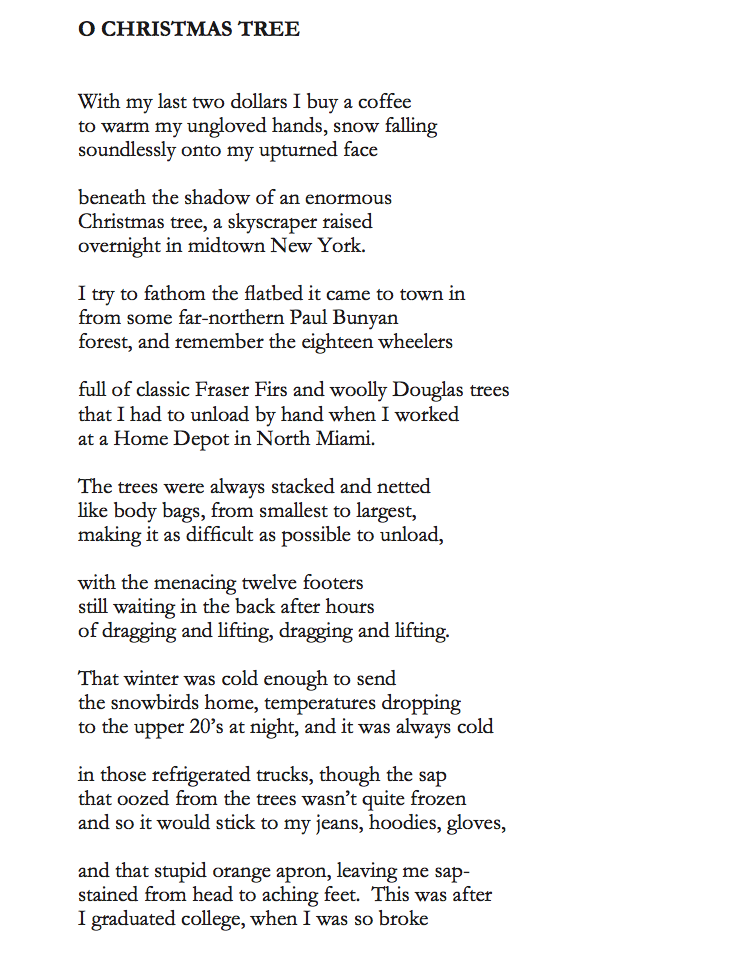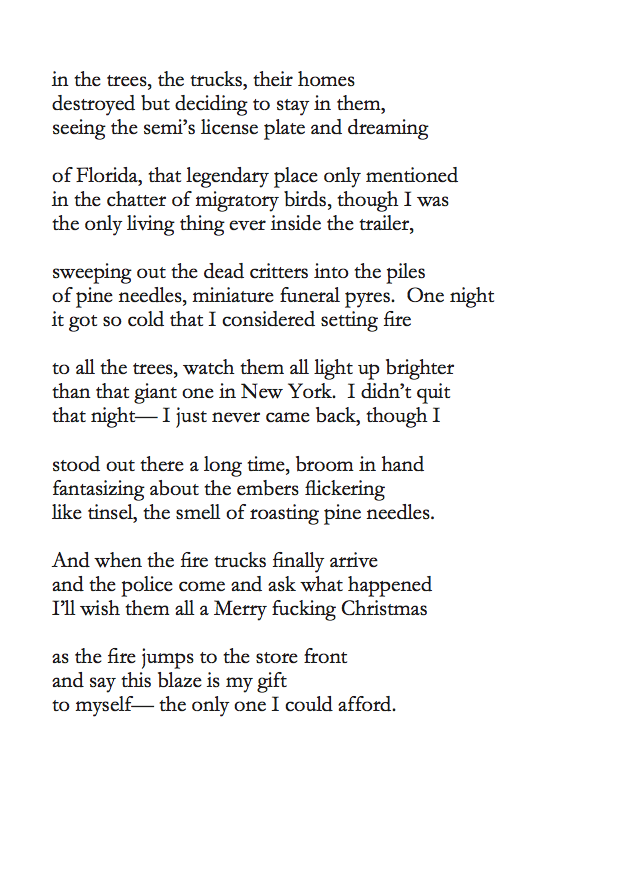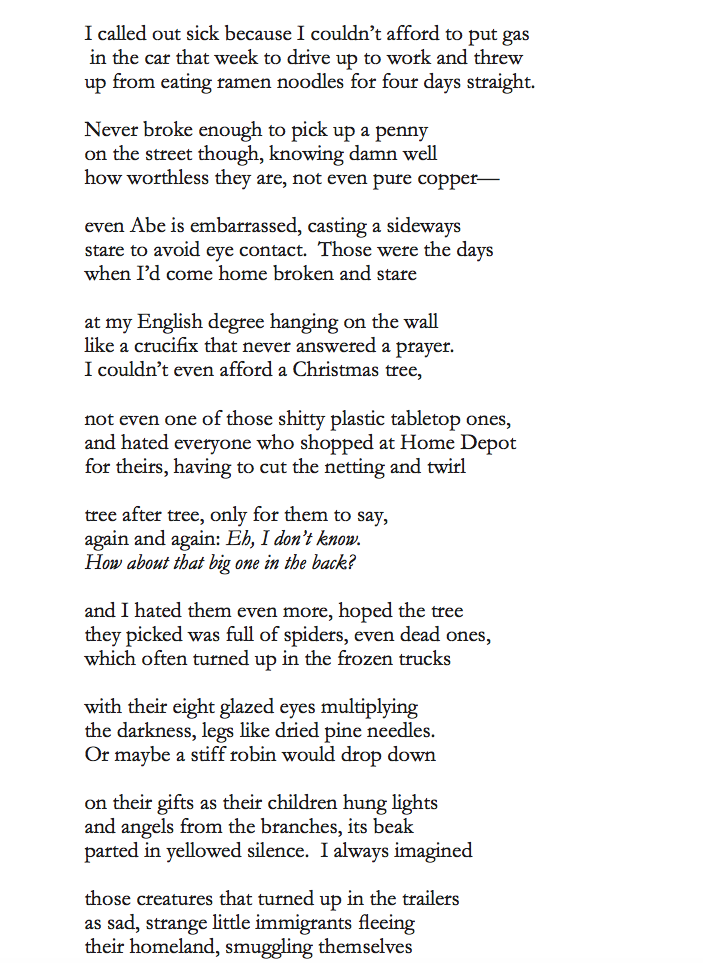All My Heroes Read Poetry
Sarah A. O'Brien
Poet Ariel Francisco
Ariel Francisco delivers the ultimate companion for the solitude-seeking writer with his latest collection of poetry, All My Heroes Are Broke (C&R Press, 2017). Split into two parts, the book offers a glimpse into the emotions and struggles of a blue-collar poet. The collection delves into Francisco’s literary influences, as the poets who inhabit his bookshelves also make themselves at home in his writing. While setting much his poetry in what can be many writers’ kryptonite, New York City, Francisco manages to avoid cliché by employing image-driven momentum and a confessional tone. The second portion of All My Heroes Are Broke transports readers from NYC to Miami, and its author continues to construct poetry that reads as both authentic in tone and intimate in detail, still peppered with allusions to literary greats.
A first-generation Dominican/Guatemalan/American writer, Francisco freely allows his ancestry to bleed into his work. Francisco’s collection effectively utilizes setting to characterize various members of the narrator’s family. In “Upon Encountering a Street Mural of Super Mario, I Think of My Mother,” the speaker’s memory is jogged by street art, which “sends my mind racing back,” and he brings readers along on a ride through nostalgic images from the video game. Francisco writes, “always that same message / at the end of every level: / your princess is in another castle” (34). Despite the poem’s potential teetering toward predictable, Francisco shifts the tone just when you think you know where he is going next. The speaker describes how he happens upon his mother playing the game “before her night shift / at a SeaWorld gift shop / where she’d sell orca key chains, / tacky t-shirts, and glazed alligator / heads to dipshit tourists” (35). The emotional honesty Francisco embraces throughout this piece feels as pure as the scene of a small boy in awe of his mother’s gaming skills; he writes, “figured she was just trying to relax / before going to work—it didn’t occur / to me that she was trying / to save herself” (35). In any other poem, this blunt assertion would be eye-roll inducing, but Francisco’s ability to ground readers in his world (“family lunch / at McDonalds” and “dipshit tourists”) while reminding them of their own childhood results in a final image that crashes, causing waves of emotions.
Francisco allows imagery to determine tone in All My Heroes Are Broke, sidestepping cliché through tactful and surprising descriptions of familiar setting. In his piece, “Reading James Wright on the L Train,” Francisco is able to play upon the readers’ senses with first the sound of retching: “a sudden heaving pulls me from the text” (27). He then provides a visual of a man in a baseball cap getting sick on the train, “his head lolling between his knees” (27). The poet forces readers to experience this repulsive moment with the narrator, daring to evoke discomfort: “Everyone scatters to the adjacent compartments, lifting scarves up to their noses as they exit.” However, Francisco follows this prescribed desire to escape the poem with the phrase, “The vomit stretches like an evening shadow,” causing a shift in tone (27). With this simile, he transforms a disgusting incident into one that is intriguing and lovely, without ever leaving the setting of the L train. His final lines read, “The train sways lightly, like a hammock. / Beneath a sun-marred window blossoming / with jewels of frost, I begin to read aloud” (27). This diction allows for a distinctive depiction of NYC; Francisco takes what could have been written in a formulaic manner—a probably-drunk Yankees fan making a scene on the train—and instead uses his narrator’s perception to create a moment that feels at once unique and relatable; all readers have at a time used books as a means of escaping reality.
Francisco’s work is strongest when he allows his narrator’s sassiness and cynicism to shine through, which manifests in several pieces through use of insults and cuss words. In “O Christmas Tree,” the narrator reminisces about his former employment with Home Depot in Miami. The piece picks up momentum at this tonal shift in stanza five: “The trees were always stacked and netted / like body bags” (30). The poet brings exciting images to readers, such as “that stupid orange apron, leaving me sap- / stained” and “my English degree hanging on the wall / like a crucifix that never answered a prayer” (30-31). The voice builds energy as the work progresses, and readers feel present in the poem with a humorous image of the narrator “having to cut the netting and twirl / tree after tree, only for them to say, / again and again: Eh, I don’t know. / How about that big one in the back?” Then, startling readers from the standard shopping scene, Francisco presents an image of dead spiders, “which often turned up in the frozen trucks / with their eight glazed eyes multiplying / the darkness, legs like dried pine needles” (31). Here is what Francisco may do best, creating beauty out of an unsettling reality. He draws an unexpected connection between these dead spiders and “a stiff robin” and his own familiarity with the struggle of immigrants: “sad, strange little immigrants fleeing / their homeland, smuggling themselves / in the trees” (31-32).
By far, the greatest part of “O Christmas Tree” is its ending, in which the narrator romanticizes workplace arson during his final shift. Francisco writes, “I didn’t quit that night—I just never came back, though I / stood out there a long time, broom in hand / fantasizing about the embers flickering / like tinsel, the smell of roasting pine needles” (32). He then imagines what he’d do when authorities arrived on the scene: “I’ll wish them all a Merry fucking Christmas / as the fire jumps to the store front / and say this blaze is my gift / to myself—the only one I could afford” (32). In these final lines, the flippant attitude of the narrator is felt through that sarcastic sentiment, “Merry fucking Christmas,” and a sense of irony and desperation is maintained with the phrase, “gift / to myself—the only one I could afford.” Readers are engaged with this moment due to the place-based, sensory imagery woven into the poem up to this point, especially “embers flickering” and “smell of roasting pine needles.” Using the relatable experience of a dreaded day-job, Francisco creates a mood that readers can rally behind: burn that place to the ground! He transforms a despondent scene—a man has become unemployed, leaving without notice—into an empowering one.
Overall, Francisco's debut full collection is a delight to read, offering vibrant and nuanced depictions of New York and Florida as well as of the writer's own culture. Some standout phrases include the following: “silhouette of a dream-sized woman” (“A View of the Statue of Liberty From The Brooklyn Bridge," 7); “Even under winter’s / tightest fist some light still slips through” (“I Know You Love Manhattan But You Should Look Up More Often," 11); "snowflakes settling into his / slicked back hair like nesting sparrows / seeking safety, the sky crying its apologies" (“Reading Lorca At Union Square," 15); “dandelions that dissipate in the night’s wheezing breath" (“Lights Out, Vagabond," 53); and “I think the sky a dream / not yet starred by bullets" (“The World And Everything In It," 64). In addition to crafting evocative images such as these, Francisco is able to juxtapose neutral observation with implied judgment in very few words. For instance, his narrator describes crowds to be “like so many / pennies at the bottom of a wishing well / rippling beneath another tossed prayer” (“Looking Down From Atop the Empire State Building," 14). The words “another" and “tossed" paint an irreverent tone, subtly mocking those who place faith in fountains and the like.
Francisco's skill, apparent throughout All My Heroes Are Broke, lies in allowing detailed setting to reveal character quirks and emotional truths. This book will leave readers looking forward to more from Francisco in the future.
Francisco's book is available now from C&R Press.
A powerful poem from All My Heroes Are Broke, page 29
Ariel Francisco is the author of All My Heroes Are Broke (C&R Press, 2017) and Before Snowfall, After Rain (Glass Poetry Press, 2016). Born in the Bronx to Dominican and Guatemalan parents, he completed his MFA at Florida International University in Miami. His poems have appeared or are forthcoming in The Academy of American Poets, The American Poetry Review, Best New Poets 2016, Gulf Coast, Washington Square, and elsewhere. He lives and teaches in South Florida.
Sarah A. O'Brien is the Founder and Editor-in-Chief of Boston Accent Lit.






